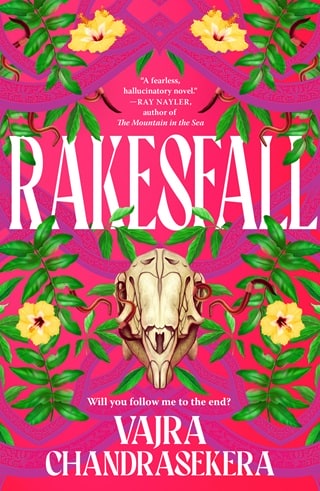Chapter 13 The Red Web
Vidyucchika goes to visit Grandmother Sits, who is dead. She is in what Vidyucchika remembers from early childhood to be a customary posture, sitting at her Formica kitchen table near the window, looking northwest, her eyes cloudy. The light from the window is muddy, sticky and pooling. There is a brown paper bag of groceries on the table, the lyrate leaves of radishes sticking out, and beside it a cup of steaming tea. Grandmother Sits doesn't look much worse than she did alive. She pats the bench next to her, and Vidyucchika sits, shivering lightly from her fever. Lambajihva stirs in the kitchen walls, and Grandmother Sits turns her head to look at him.
"And who is this?" she asks. "Come sit at the table, young man."
Lambajihva comes out of the wall and sits opposite them. Vidyucchika hasn't seen his face in a while; it is startling, his eyes too wide, his mouth closed tight, and the tongue for which she'd named him—in another life, so long ago now—not to be seen.
"He's haunting me," Vidyucchika explains. "It's a long story. It's my fault, don't mind him."
"Well, as long as he's not skulking in my walls," Grandmother Sits says, and turns back to her. "I'm glad my daughter managed to get in touch with you." She has no visible sign of death on her; Vidyucchika wonders if perhaps Odeg wrote down her parents' message wrong, if perhaps Grandmother Giri is the one who died. But then Grandmother Sits continues: "I wanted to give you a last birthday gift, before we the dead pass on into the red web."
"You know of the red web?" Vidyucchika says, speaking with the echo of the skinless face underneath hers. Then, with her own lips, she says, "But it's not my birthday."
Her grandmother laughs. "Call it early, or late." She points at the bag of groceries on the table. Vidyucchika peeks: underneath the radishes, it is full of plastic explosive. Grandmother Sits only ever gives explosives on birthdays.
"I should warn you against eating it," Grandmother Sits says. "You don't do drugs, do you? You're a good girl? You can get high by eating small amounts of C-4, but you shouldn't: if you eat too much it will give you seizures and myalgias, hyperreflexia, and haematuria—blood in your water. It will give you visions of war and death. You will vomit, stare into the abyss, sink into lethargy and perhaps coma."
"I won't eat it, Grandmother," Vidyucchika says.
"I've eaten a lot of it in my day," Grandmother Sits confides. "Why, I'm more plastique animée than woman." She moves in place slowly to demonstrate. It's like dancing, but not—there is no music, only a thick silence in which is submerged the subtle creakings of the house, faint rumblings of traffic outside, and fragments of urban birdsong. No new year birds: it is not their season.
Lambajihva reaches for the bag of explosive and Vidyucchika hisses at him until he backs down.
"That which we call the red web, sometimes the red wheel," Grandmother Sits says, "is a model of the universe. We look at the ocean and draw sea lanes on it; we draw lines of longitude and latitude; we draw lines of claims and territory; we draw time itself in twisty and accommodating lines. We say, this is traffic and that is trade; this is tomorrow and that is yesterday; this is mine and that is yours, and beyond be monsters and pirates and witchcraft. And all this is not inaccurate, because after all ships ply and trade flows and oil leaks. But it is not the ocean."
"The red web is not red nor a web," Vidyucchika agrees. "Nor a wheel. I'm not a child, Grandmother. I understand a metaphor when I am beaten about the head with it."
"Always you were a cantankerous child," Grandmother Sits says fondly. "You get that from the bitch."
Grandmother Sits has perhaps made direct reference to her counterpart in the war of the grandmothers less than five times in Vidyucchika's entire life, including this instance. It shocks Vidyucchika into silence, glaring at Lambajihva for intruding on this family argument. Lambajihva's dead eyes don't quite focus, so he cannot glare back. His face holds little in the way of expression.
"I don't know what you and this boy are working through," Grandmother Sits says, studying the pair of them. "But you will have to put him aside for a moment. Go where needs going and do what needs doing."
"Haven't I already done it?" Vidyucchika says helplessly. "The prime torturer… I—he—"
"You haven't already done all of it yet," Grandmother Sits points out. "Not the other halves that turn all your dangling threads into strings, tie them together into web. You haven't already done it because if you had I wouldn't be asking you to do it."
"But what's the hurry?" Vidyucchika whines. "Can't I do it later, when I'm old and wise and come into the fullness of my power? I'm still young, I don't know anything. What if I do it wrong and break the wheel?"
"This is a very important lesson," Grandmother Sits says. "Perhaps the most important part of your initiation, which of course will never quite be completed, you understand; you will always be beginning again, just never twice in the same place. The lesson is that the red wheel cannot be broken, whether by accident or intention, though you can certainly be broken upon it. The lesson is that you can't win. You can only keep moving. You are doomed to failure, which is to say, to life, which is full of pain. There will never be a final synthesis that unifies all worlds and resolves all dialectics. You can only resolve your own paradoxes and become more of who you are."
"If I'm doomed to failure anyway," Vidyucchika says, cleverly though she is filled with despair, "why must I seek it out now? I can leave it for later later."
Grandmother Sits rubs her jaw, where what once used to be a dimple is now an impact crater from which crackling waves of wrinkles corrugate outward. "Because you're not much longer for this world. I know you—you're restless. You'll want to seek out new worlds soon, new lives, new hauntings. And the more you grow, the more you become someone else and someone else, the more you put off the enjambment of your paradoxes, the resolution of your own crises, the less likely that you will still care. Other things will occupy your attention. Bigger or more immediate things will seem paramount. Is that not already the case, with this one here?" She waves at Lambajihva. "Imagine yourself a thousand lives deep, old and strange and overflowing with the drama and strife of ten thousand beloveds, rivals, enemies, and comrades."
"And what happens if I never fix it? What if I just never go back?" Vidyucchika demands. She is growing angry because her grandmother's attitude is making her life, this life fall away as if it were a mere detail. She holds her face with both hands, fingers splayed over her cheeks, to prevent it from sliding off to expose the skinlessness beneath. The fever heat radiates from the self beneath the self.
"Monstrosity," Grandmother Sits says. "You will lose your human heart and the human logic of your mind. Unbecoming. You will be lost to the line and to our works, as we have already lost too many. Catastrophe. Our project will suffer for it; all the threads we have wound will fray a little more; some more will come undone. You will become an agent of pain."
"Whose agent am I meant to be instead?" Vidyucchika says, with what is not quite a sneer but only just. "Yours? Of the long line—but which long line? Are we agents of peace? Of life and light? Are we cosmic dollar crows meddling in sovereign realities? Who do we work for? How are we paid?"
"All the long lines together form the web," Grandmother Sits points out. She takes a sip of her tea, now cold. "We are scientists. We bear terrible knowledges. We are the agents of death, and our wages in arrears will be paid as a lump sum upon retirement, when all our work is done, when all the worlds are laid to rest in the dark."
 Fullepub
Fullepub 



